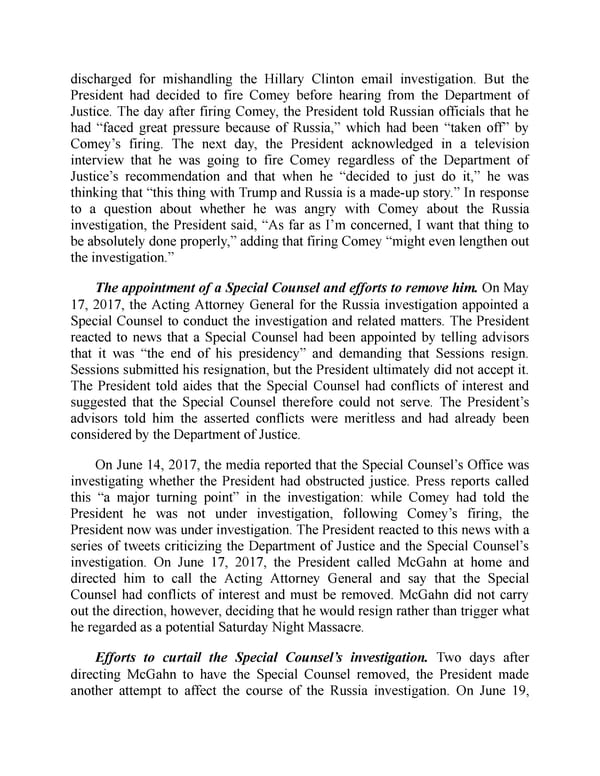discharged for mishandling the Hillary Clinton email investigation. But the President had decided to fire Comey before hearing from the Department of Justice. The day after firing Comey, the President told Russian officials that he had “faced great pressure because of Russia,” which had been “taken off” by Comey’s firing. The next day, the President acknowledged in a television interview that he was going to fire Comey regardless of the Department of Justice’s recommendation and that when he “decided to just do it,” he was thinking that “this thing with Trump and Russia is a made-up story.” In response to a question about whether he was angry with Comey about the Russia investigation, the President said, “As far as I’m concerned, I want that thing to be absolutely done properly,” adding that firing Comey “might even lengthen out the investigation.” The appointment of a Special Counsel and efforts to remove him. On May 17, 2017, the Acting Attorney General for the Russia investigation appointed a Special Counsel to conduct the investigation and related matters. The President reacted to news that a Special Counsel had been appointed by telling advisors that it was “the end of his presidency” and demanding that Sessions resign. Sessions submitted his resignation, but the President ultimately did not accept it. The President told aides that the Special Counsel had conflicts of interest and suggested that the Special Counsel therefore could not serve. The President’s advisors told him the asserted conflicts were meritless and had already been considered by the Department of Justice. On June 14, 2017, the media reported that the Special Counsel’s Office was investigating whether the President had obstructed justice. Press reports called this “a major turning point” in the investigation: while Comey had told the President he was not under investigation, following Comey’s firing, the President now was under investigation. The President reacted to this news with a series of tweets criticizing the Department of Justice and the Special Counsel’s investigation. On June 17, 2017, the President called McGahn at home and directed him to call the Acting Attorney General and say that the Special Counsel had conflicts of interest and must be removed. McGahn did not carry out the direction, however, deciding that he would resign rather than trigger what he regarded as a potential Saturday Night Massacre. Efforts to curtail the Special Counsel’s investigation. Two days after directing McGahn to have the Special Counsel removed, the President made another attempt to affect the course of the Russia investigation. On June 19,
 Mueller Report PDF Page 277 Page 279
Mueller Report PDF Page 277 Page 279